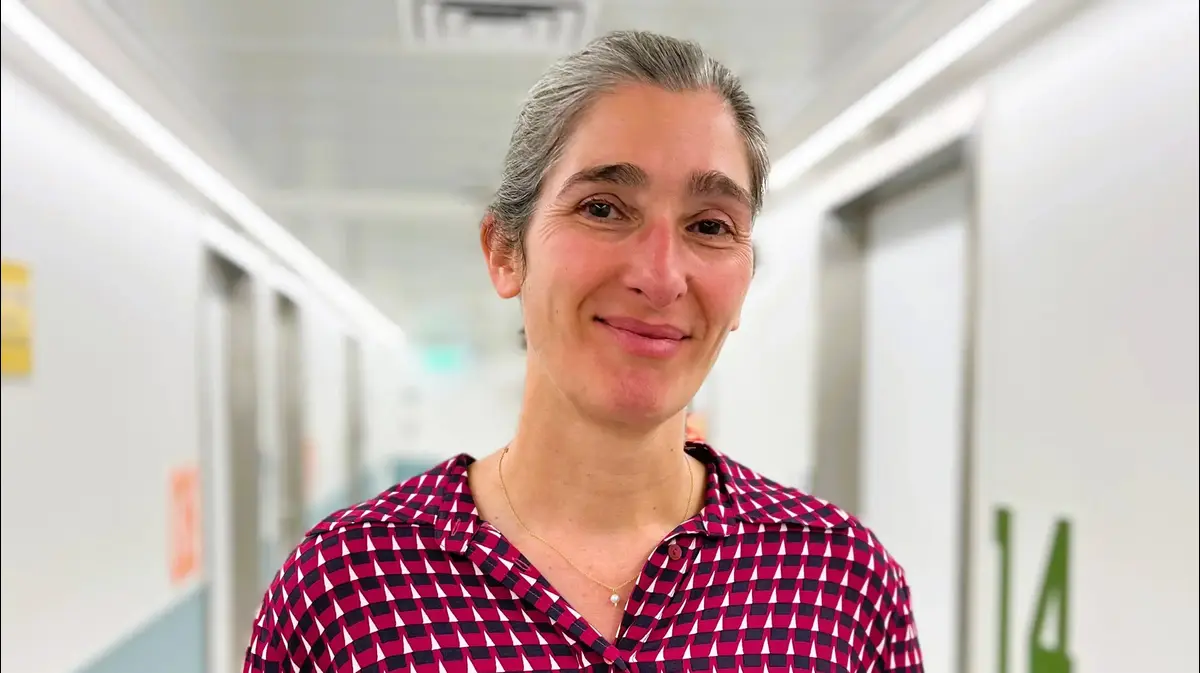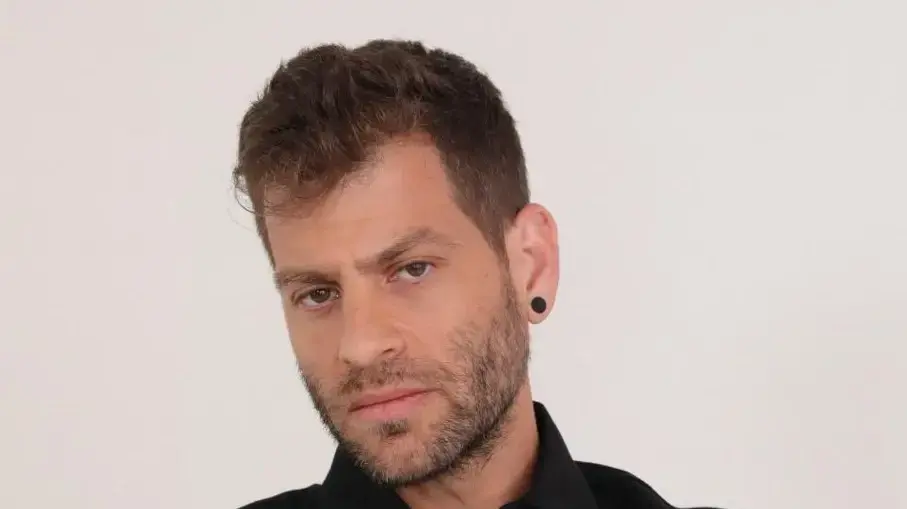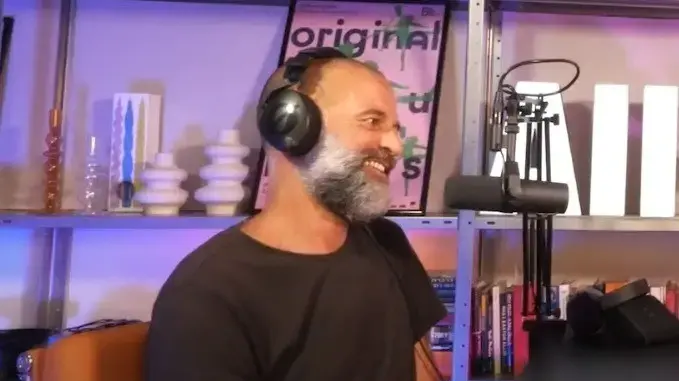Enlarge image
Two boys stand on the beach in Tel Aviv as the sirens sound on Holocaust Remembrance Day
Photo: Nir Elias / REUTERS
SPIEGEL:
Mr. Auerbach, in Israel you work with people who were traumatized by the Holocaust, even if some of them didn't experience it themselves.
In such cases one speaks of a “transgenerational trauma” – can terrible experiences be passed on?
Auerbach:
It sounds paradoxical that an experience from the past should have an effect on someone even though they didn't have it themselves.
But we now know from research that passing on traumatic experiences can happen in many different ways.
On the one hand through direct telling, but also through concealment.
In this case, children of traumatized people learn from other sources that there is a family history in which violence was experienced.
Many traumatized parents want to protect their children, but the feelings are passed on anyway.
These parents have nightmares at night and scream in a language the children don't understand.
Or they react with great fear when they see people in uniform.
Parents who have experienced a famine often react very violently,
when children don't want to eat something or throw it away.
Eating becomes something very important.
The children then sense that something is there, but they don't know exactly what.
It's like a dark cloud.
SPIEGEL:
Recent research is also concerned with the genetic transmission of trauma.
How does this work?
Auerbach:
Our genetic material does not change significantly from generation to generation, the content remains the same.
However, it has been found that there can be an epigenetic change.
All genetic information is never read and converted, only a small part.
This selection is determined by environmental influences.
You can think of it like a switch mechanism, certain genes are switched on or off.
When someone has parents who have experienced major trauma that has biological after-effects, the entire stress-regulating system is severely disrupted.
The mother or father suffers from insomnia, is depressed, cannot regulate emotions, reacts strongly to stimuli, lives in constant expectation of catastrophe.
What does this mean for the descendants of these people?
In their genes, different areas are sensitized or under-sensitized.
Above all, it is about the stress hormones, the way in which one reacts biologically to stress.
If the parents have Post Traumatic Stress Disorder (PTSD), the next generation is more vulnerable and more likely than others to develop PTSD when new stresses arise.
SPIEGEL:
How can that be proven?
Auerbach:
This has been found, for example, in soldiers from the second generation of Holocaust survivors who have experienced trauma in military service and war in Israel.
In the first years after the trauma of the war, they suffered from more post-traumatic symptoms than the comparison group of soldiers whose parents were not Holocaust survivors.
However, in a follow-up study 17 years later, surprisingly, many of them showed an amazing ability to recover.
Both vulnerability and resilience are therefore transferrable.
There is also an interesting study from the USA.
They interviewed women who were in their second and third trimesters during the September 11, 2001 attack and who were in Manhattan near the Twin Towers.
Some of them showed post-traumatic stress disorder.
A year later, their children were examined.
It turned out that these also showed a changed stress hormone level, which can lead to a higher susceptibility to stress.
So there is even transmission in the womb.
SPIEGEL:
Is everyone who experiences a traumatic situation traumatized afterwards?
Auerbach
: Not everyone who has experienced something traumatic becomes mentally ill.
Some develop only mild sequelae.
It also depends a lot on personal circumstances.
Helplessness and fear are the basic feelings of trauma.
Children who were hidden for years during the Second World War and always felt helpless, this feeling often accompanies them throughout their lives.
People who have seen family members killed or tortured are haunted by these experiences in nightmares and flashbacks.
But if, for example, as a child in a ghetto, hiding place or concentration camp you had another person who was there for you, who supported you, so you didn't feel alone, then you can get over such a traumatic situation more easily.
Or when people experience an earthquake - and there is solidarity, everyone helps everyone, then it is a tragic experience, but often something from which strength can be drawn.
Something difficult was mastered together.
SPIEGEL:
Don't natural disasters cause trauma?
Auerbach:
Significantly less, and that's understandable.
What distinguishes natural disasters from war or genocide?
Terrible things are happening: people are dying, disappearing, being buried, families torn apart, entire communities devastated - but it's not directly caused by people.
But when people hurt other people, it's not just a trauma because something bad happened, but this trauma undermines the basic trust in other people.
Can I rely on others?
What more harm can be done to me?
Why was this done to me?
In a natural disaster, on the other hand, there is nothing personal about it.
SPIEGEL:
So trauma is primarily caused by people?
Auerbach:
Yes.
And the closer I am to a person who is doing something to me, the worse.
This is why incest or domestic violence is so harmful.
It comes from people who are supposed to protect me.
That can be a lot more traumatic than when an anonymous soldier does something to the other side.
SPIEGEL:
One speaks of "post memory" or scenic remembering in the second or third generation after a trauma.
What do you mean with that?
Auerbach:
I have an example from my personal history.
I am the child of Holocaust survivors.
In the post-war period I went to school in Vienna and felt at home there – but not in the schoolyard.
I was very reluctant to go there, I never played there.
Much later I found out that during the war this courtyard served as a central collection point for Jews from all districts of the city.
From there they were transported to the concentration camps.
But how could I sense that there was something spooky about this place?
I can't explain it exactly, but maybe the feeling came from hints or the reaction of the adults, the teachers, some of whom I think are somewhat
knew about the past of this schoolyard.
But nothing was said about it.
That is why the culture of remembrance is so important.
A commemorative plaque hangs there today, and the school may be talking about the history of the farm.
Life can go on like this.
SPIEGEL:
So for you, talking about the past is the key to a kind of healing?
Auerbach:
A past that has not been dealt with is a great burden.
You have to know what was going on.
Uncovering and talking is painful because grief work becomes necessary or because responsibility has to be taken.
But I think the culture of remembrance, i.e. commemoration days, memoirs, witnesses who go to schools and talk, even stumbling blocks, is extremely important.
SPIEGEL:
Some scientists are critical of the concept of trauma because they fear that it could lead to a dilution of the Holocaust as a singular historical phenomenon.
As a psychotherapist and psychiatrist, you obviously have a different opinion.
Auerbach:
Comparisons are never good, everyone has their own history and special features, so I don't think it's good to compare the Holocaust with other collective experiences of violence, these are all singular events.
Nevertheless, one can also recognize similarities and learn lessons from the different events.
For example, one should be able to derive something for other violent events from the fact that the Holocaust still has significant effects in the second and third generation.
SPIEGEL:
In Ukraine, terrible war crimes are currently being committed by Russian soldiers, violence against women and children, the destruction of the energy infrastructure, people are freezing.
How will this affect?
Auerbach:
Of course it will affect people for generations.
But something is happening in Ukraine right now that isn't happening in Eritrea or Ethiopia: it's in the public eye.
You can directly follow the suffering of the people.
It is reported, documented;
there is a kind of recognition.
We know very little about other conflicts, such as the one in the Tigray region with far more deaths, injuries and starvation.
That's what I hear from Holocaust survivors when we talk about Ukraine.
I ask her what the war means to her.
They say it's awful and reminds them of things they've experienced.
But there is a difference: Today we talk about it.
Back when it happened to them in the Holocaust, they were left alone,
SPIEGEL:
Is there such a thing as reparations?
Auerbach:
No.
But you can try to give traumatized people as much security as possible and listen to them.
But if someone has experienced a trauma and then gets the feeling that you don't believe them, that you don't want to hear it, that means that you're actually telling people: "I don't care about your suffering." That can lead to these people believe they must stick to the same strategy that helped them survive.
They look at themselves first, expecting to be followed at any moment, building a strong defensive stance.
We also see that in Israeli society.
SPIEGEL:
In addition to working with Holocaust survivors, your organization AMCHA has also set up a refugee clinic in Israel.
There they help severely traumatized people who, for example, came via Sinai and were tortured there.
What are your experiences with their trauma?
Auerbach:
The refugees who came to Israel from Africa in the past two decades live in a situation of great insecurity because they do not have refugee status.
It is not clear how long they can stay, whether their children will have to leave Israel again.
When they start a family, we see that they often just live on for the next generation.
But those who have no children often no longer have the will to live.
So how I cope with a trauma depends heavily on my current, existential situation.
SPIEGEL:
People who have experienced trauma are not only victims, they have also managed to survive.
What does this mean for their descendants?
Auerbach:
It is not the exception, but rather the rule, that Holocaust survivors can show both instability and at the same time a great deal of resilience and empathy.
They not only had the courage, the initiative, the will to live - often coincidence and luck were also involved - to master the circumstances and survive.
They also had the will to move on and rebuild their families and communities afterward.
Both aspects are formative for the second generation and the following generations: They grew up with the shadow of the traumata, but also experienced in a formative way the vitality of their parents and grandparents and their ability to overcome adversity without losing their humanity.
For them, this is a significant legacy and role model – and one that is also passed on from generation to generation.
This contribution is part of the Global Society project
Expand areaWhat is the Global Society project?
Under the title »Global Society«, reporters from
Asia, Africa, Latin America and Europe
report on injustices in a globalized world, socio-political challenges and sustainable development.
The reports, analyses, photo series, videos and podcasts appear in a separate section in the foreign section of SPIEGEL.
The project is long-term and is supported by the Bill & Melinda Gates Foundation (BMGF).
A detailed FAQ with questions and answers about the project can be found here.
AreaWhat does the funding look like in concrete terms?open
The Bill & Melinda Gates Foundation (BMGF) has been supporting the project since 2019 for an initial period of three years with a total of around 2.3 million euros - around 760,000 euros per year.
In 2021, the project was extended by almost three and a half years until spring 2025 under the same conditions.
AreaIs the journalistic content independent of the foundation?open
Yes.
The editorial content is created without the influence of the Gates Foundation.
AreaDo other media also have similar projects?open
Yes.
Major European media outlets such as The Guardian and El País have set up similar sections on their news sites with Global Development and Planeta Futuro, respectively, with the support of the Gates Foundation.
Did SPIEGEL already have similar projects? open
In recent years, DER SPIEGEL has already implemented two projects with the European Journalism Center (EJC) and the support of the Bill & Melinda Gates Foundation: the "Expedition ÜberMorgen" on global sustainability goals and the journalistic refugee project "The New Arrivals", within the framework of which several award-winning multimedia reports on the topics of migration and flight have been created.
Expand areaWhere can I find all publications on the Global Society?
The pieces can be found at SPIEGEL on the Global Society topic page.






/cloudfront-eu-central-1.images.arcpublishing.com/prisa/56XAYHM37FH45ARX6TUXG63UWQ.jpg)


